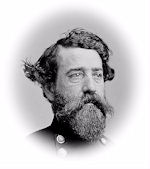Tuesday.—Now this, they say, is positive: “Fort Sumter is to be released and we are to have no war.” After all, far too good to be true. Mr. Browne told us that, at one of the peace intervals (I mean intervals in the interest of peace), Lincoln flew through Baltimore, locked up in an express car. He wore a Scotch cap.
We went to the Congress. Governor Cobb, who presides over that august body, put James Chesnut in the chair, and came down to talk to us. He told us why the pay of Congressmen was fixed in secret session, and why the amount of it was never divulged—to prevent the lodginghouse and hotel people from making their bills of a size to cover it all. “The bill would be sure to correspond with the pay,” he said.
In the hotel parlor we had a scene. Mrs. Scott was describing Lincoln, who is of the cleverest Yankee type. She said: “Awfully ugly, even grotesque in appearance, the kind who are always at the corner stores, sitting on boxes, whittling sticks, and telling stories as funny as they are vulgar.” Here I interposed: “But Stephen A. Douglas said one day to Mr. Chesnut, ‘Lincoln is the hardest fellow to handle I have ever encountered yet.’ ” Mr. Scott is from California, and said Lincoln is “an utter American specimen, coarse, rough, and strong; a good-natured, kind creature; as pleasant-tempered as he is clever, and if this country can be joked and laughed out of its rights he is the kind-hearted fellow to do it. Now if there is a war and it pinches the Yankee pocket instead of filling it ——-”
Here a shrill voice came from the next room (which opened upon the one we were in by folding doors thrown wide open) and said: “Yankees are no more mean and stingy than you are. People at the North are just as good as people at the South.” The speaker advanced upon us in great wrath.
Mrs. Scott apologized and made some smooth, polite remark, though evidently much embarrassed. But the vinegar face and curly pate refused to receive any concessions, and replied: “That comes with a very bad grace after what you were saying,” and she harangued us loudly for several minutes. Some one in the other room giggled outright, but we were quiet as mice. Nobody wanted to hurt her feelings. She was one against so many. If I were at the North, I should expect them to belabor us, and should hold my tongue. We separated North from South because of incompatibility of temper. We are divorced because we have hated each other so. If we could only separate, a “separation à l’agréable,” as the French say it, and not have a horrid fight for divorce.
The poor exile had already been insulted, she said. She was playing “Yankee Doodle ” on the piano before breakfast to soothe her wounded spirit, and the Judge came in and calmly requested her to “leave out the Yankee while she played the Doodle.” The Yankee end of it did not suit our climate, he said; was totally out of place and had got out of its latitude.
A man said aloud: “This war talk is nothing. It will soon blow over. Only a fuss gotten up by that Charleston clique.” Mr. Toombs asked him to show his passports, for a man who uses such language is a suspicious character.









